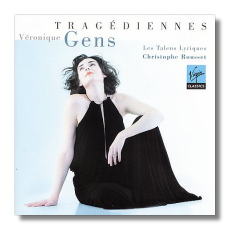
The Internet's Premier Classical Music Source
Related Links
- Latest Reviews
- More Reviews
-
By Composer
-
Collections
DVD & Blu-ray
Books
Concert Reviews
Articles/Interviews
Software
Audio
Search Amazon
Recommended Links
Site News
 CD Review
CD Review
Tragédiennes

- Jean-Baptiste Lully: Armide, LWV 71 -
- Act II, Scene 5
- Aria "Venez, Haine implacable"
- Overture
- Passacaglia
- Jean-Philippe Rameau:
- Hippolyte et Aricie -
- Aria "Cruelle mère des amours"
- Act III - Prelude
- Chaconne
- Castor et Pollux -
- Aria "Tristes apprêts"
- Chaconne
- Les fêtes de Polymnie - Que ses regrets m'ont attendrie
- Jean Joseph Mondonville: Isbé - Désirs toujours détruits
- Jean Marie Leclair: Scylla et Glaucus, Op. 11 -
- Aria "Et toi, dont les embresements… Noires divinités"
- Aria "Brillante fille de Latone"
- Overture
- Air of the Demons I & II
- Joseph Nicolas P. Royer:
- Le Pouvoir de l'Amour - L'objet qui règne dans mon âme
- Zaïde, reine de Grenade - Dieu des amants fidèles
- André Campra: Le carnaval de Venise - Mes yeux, fermez-vous à jamais
- Christoph Willibald Gluck:
- Iphigénie en Aulide - Dieux puissants que j'atteste… Jupiter, lance la foudre
- Armide - Enfin, il est en ma puissance
Véronique Gens, soprano
Les Talens Lyriques/Christophe Rousset
Virgin Classics 3 46762-2 DDD 70:05
Most of this recital takes us back to France in the 1730s and 1740s. Opera still was young, but divas already stalked the stage, inspiring both admiration and outrage among commentators of the time. (If they dared to perform in public, particularly in secular roles, woman singers risked being lumped together with prostitutes.) These were two rich decades for the developing art form. This CD includes scenes, arias, and orchestral music from operas by Jean-Philippe Rameau (Hippolyte et Aricie (1733), Castor et Pollux (1737), Les Fêtes de Polymnie (1745)), Jean-Joseph Cassaneade Mondonville (Isbé (1742)), Jean-Marie Leclair (Scylla et Glaucus (1746)), and Pancrace Royer (Le Pouvoir de l'Amour (1743) and Zaïde, reine de Grenade (1739)). Gens and Rousset also give us a taste of predecessor works by Jean-Baptiste Lully (Armide (1686)) and André Campra (Le Carnavalde Venise (1699)), and bring Baroque opera to an apex with music by Christoph Willibald Gluck (Iphigénie en Aulide (1774) and Armide (1777)). The inclusion of music from both Lully's and Gluck's versions of Armide is a clever programming idea. In fact, one can compare the composers' setting of the same text – the heroine's aria, "Enfin, il est en ma puissance. "
The style already was beginning to change at the time of Gluck, but before him, when composers set texts, the music tended to be declamatory in style. In other words, singing mirrored speech much more than it would during Mozart's time, for example. That's not to say that the music wasn't attractive, but it was composed to complement the all-important words; it wasn't a matter of writing a pretty tune and then finding a text to go with it. It is for that reason that early operas tend to be less popular with listeners today – they don't lend themselves to being sung in the shower or in rush-hour traffic. Still, when one takes the time to listen to them – libretto in hand, if need be – one can appreciate the skill with which these composers made the "tender passions" and noble emotions expressed by operatic heroines of the time seem immediate, even across the centuries.
Gens is definitely the right singer for this task. Her vocal manner is imposing, and even if she were not a great singer, one senses that she could simply declaim these texts without music and still create a dramatic effect. She understands that characters such as Armide, Circé, and Phèdre were both women and symbols of human virtue and vice. At the same time, Gens needs to be "real" and to be bigger than life, and she resolves this apparent contradiction with yards and yards of glorious singing and temperament. I was particularly impressed with her scene from Leclair's Scylla et Glaucus, in which she plays the role of the enchantress Circé vengefully conjuring up infernal powers. Her voice quivers with passionate rage, and yet she never loses control of it, or of Leclair's exquisitely crafted music. The inclusion of extended passages for orchestra alone (the Ouverture and two "danses des démons") helps to put Circé's rage in context. Rousset conducts with a fine dramatic sense, and Les Talens Lyriques play expressively, but without harshness or acidity.
The booklet contains an essay, texts, and translations. It would have been wonderful if the booklet also could have included a few words to "set up" each excerpt and to place it in a dramatic context, particularly for those readers whose knowledge of classical literature is a little rusty! Still, Gens is classy and stylish, and this is fascinating stuff, so I don't want to complain too loudly.
Copyright © 2006, Raymond Tuttle




















